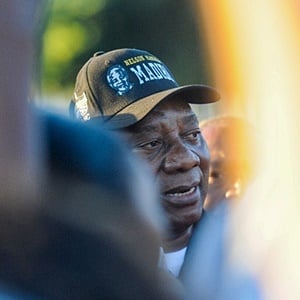
President Cyril Ramaphosa during his walk from Gugulethu to Athlone. (Jaco Marais, Netwerk24)
Multimedia · User Galleries · News in Pictures Send us your pictures · Send us your stories

President Cyril Ramaphosa during his walk from Gugulethu to Athlone. (Jaco Marais, Netwerk24)
Multimedia · User Galleries · News in Pictures Send us your pictures · Send us your stories

Close your eyes and cast you mind back to May 2017.
Almost two months earlier, former president Jacob Zuma had wielded his sword at Treasury and removed the two knights guarding the fiscus: Pravin Gordhan and Mcebisi Jonas.
This was Zuma's ultimate get-back at his "detractors" in Cabinet and the ANC, unofficially led by then deputy president Cyril Ramaphosa, who prevented a coup on Treasury in December 2015 when Zuma replaced the well-respected Nhlanhla Nene with the former mayor of a small town.
The mayor arrived at Treasury, flanked by advisers linked to the Gupta family and ANC deputy secretary-general Jessie Duarte.
In an act of selfless bravery, Ramaphosa, Zweli Mkhize, Jeff Radebe and a group of bankers convinced Zuma of the catastrophic consequences for South Africa’s economy if Des "Weekend Special" van Rooyen was allowed to continue in his position.
Zuma capitulated, bitterly.
Later, as power slipped away from his greasy hold on South Africa, Zuma publicly slandered those who convinced him to shift Van Rooyen as part of some white-led capitalist conspiracy to maintain the status quo.
This mantra, cooked up by Bell Pottinger in London for their clients Duduzane Zuma and the Guptas, became the rallying call for Zuma's survival and the campaign theme for Nkosazana Dlamini-Zuma to take over the reins from Msholozi in December 2017.
White monopoly capital (WMC) morphed into Radical Economic Transformation (RET) and anyone who dared to criticise Zuma or the Guptas were branded anti-transformation or anti-black.
With the support of a million-strong Twitter bot army, engineered by their British PR firm and powered by merchants of the dark web in Israel and India, the Zuptas almost managed to destroy South Africa.
And no, this is not an exaggeration. At its core, the aim of the campaign was to divide and destroy. South Africa's already tenuous race relations were further polarised and the #GuptaLeaks showed us the extent to which government funds were looted to the benefit of the Zuptas.
Eskom was driven to near-collapse and instead of fixing our railways to get the economy going and decrease the number of trucks on our pothole-ridden roads, Transnet became the piggy-bank for the state capture project.
Denel's government-funded military intellectual property was shipped abroad for the benefit of one or two families.
The economy suffered and South Africa "achieved" junk status for the first time since 1994.
This is the background to which Ramaphosa took over as ANC president in December (with a mere margin of 179 votes) and state president in February, and to which we should judge his first 100 days in office.
I remembered the nightmare of 12 months ago this week as I listened to Gordhan, back as public enterprises minister, announcing wholesale changes to the boards of the terminally ill state-owned enterprises, including the permanent appointment of the superb Phakamani Hadebe as CEO of Eskom.
Take a moment to consider the catastrophe that was avoided by Ramaphosa's victory in December at Nasrec. Had the trade unionist-turned-businessman and farmer not managed to score the narrowest of victories through the most intriguing of chess games, this is what South Africa could have looked like today.
Zuma would still have been president. The Guptas would still have been running the country from Saxonwold. Eskom would have run out of money and we would probably have had to borrow from the International Monetary Fund to keep afloat. Tom Moyane would still have been the boss of SARS and Arthur Fraser would have continued as the spy boss through his underhanded ways. We would have been in the thick of a nuclear tender process, with Russia starting to pack their shipping containers. Et cetera.
A nightmare, indeed.
Ramaphosa is no saint and we should guard against deifying politicians. But let’s give credit where credit is due: Ramaphosa has managed to drag us from the gutter with a clear vision and willingness to do the right thing.
His clarion call for action – thuma mina! – has resonated with millions of South Africans who want the same thing, irrespective of race, gender or creed: a decent job, a house, a good education for our children, decent healthcare and peace.
Ramaphosa cannot achieve this on his own and now needs to consolidate his power in the ANC and the state to make sure every mayor and civil servant from Babanango to Springbok wakes up with an enduring urge to do the right thing.
Those who are only interested in their own bellies should be shipped out or locked up.
For relieving us from the nightmare that was the Zuma years and swiftly acting to start an intense process of damage control, Ramaphosa passes his first 100 days with a distinction in my books.
- Basson is editor of News24. Follow him on Twitter.
* See how Cyril Ramaphosa fared on the promises he made on News24's Cyril100 site.